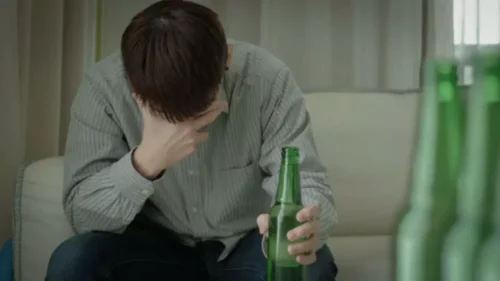
A safe, supervised environment that prevents access to substances also protects people and encourages their progress toward recovery. Medical detox clears the alcohol or drugs from your system so that your body can begin healing. While stopping cold turkey at home on your own may sound like the easiest solution, it’s usually not the safest or most effective option. Detoxing ensures that trained medical staff are monitoring your withdrawal process and can step in to alleviate your discomfort and treat more severe symptoms before they endanger your life.
Find A Rehab Center Near You
- Even with insurance coverage, it is likely that you will have some out-of-pocket expenses for substance abuse treatment services.
- Drug and alcohol medical detox programs aid people who want to overcome their substance use disorder, safely and effectively.
- You might feel anxiety that’s worse than everyday nervousness—a bit like an unpleasant but short-lived anxiety disorder.
- Other medication assisted treatments, such as naltrexone and acamprosate, can be introduced near the end of detox, but they do not treat withdrawal.
- A medically supervised detox is considered the safest and most effective approach.
drug detox is a necessary step in recovery because it focuses on safely managing withdrawal symptoms. It’s hard to watch someone’s life spiral out of control due to an addiction, and loved ones often find themselves stuck in enabling patterns that they need to break. An effective intervention will outline the consequences for what will happen if the person with the addiction does not seek treatment.
Medically-Monitored Inpatient Detoxification
In recent years, as the opioid epidemic has exploded, more hospitals have expanded their addiction services. Some prescribe buprenorphine, a narcotic that eases the symptoms of opioid withdrawal without making users feel “high.” Talk to your doctor about whether hospital detox would be right for you. At-home detox may be OK if you’re otherwise healthy and haven’t been using drugs for very long. If you believe it’s your best option, get a doctor to review your situation and approve the plan before you start.
What Are Withdrawal Symptoms?
However, detoxification—often called detox—is a powerful measure that can make a real difference in your recovery journey. This may seem like the easiest and cheapest way to detox, but quitting cold turkey can have serious health risks. Some substances are too strong to stop cold turkey without supportive medication. There are several options for going through the detox process from substances. If you only consume a substance occasionally, you can expect to see little to no withdrawal symptoms upon quitting. However, if you consume substances regularly, you may feel initial withdrawal symptoms within a few hours of quitting.
Detoxing from Stimulants

Most people who are in recovery have a more positive attitude and feel like they lead fuller, healthier lives. Our writers and reviewers are experienced professionals in medicine, addiction treatment, and healthcare. AddictionResource fact-checks all the information before publishing and uses only credible and trusted sources when citing any medical data. Calls to our general hotline may be answered by private treatment providers. We may be paid a fee for marketing or advertising by organizations that can assist with treating people with substance use disorders. Preventing withdrawal symptoms involves medical drug detox, gradually tapering off the substance while managing symptoms.

Drugs That Cause Withdrawal
“Detoxification” means to remove harmful substances from the body, primarily with the help of the liver. A detox can be metabolic, requiring a person to fast and then add back in a strict diet of clean foods and water; however, there’s little evidence to suggest that detox diets actually https://ecosoberhouse.com/ work. Medical detoxes are frequently used to treat people with addictions. Supervised by medical professionals, these detoxes allow individuals to reduce their withdrawal symptoms long enough for their bodies to adjust to life without alcohol or other addictive substances.
Is Alcohol or Drug Detox at Home Safe?

Drug and alcohol medical detox programs aid people who want to overcome their substance use disorder, safely and effectively. Detoxification, especially when guided by medical professionals through an alcohol medical detox program, is the first step toward recovery from any substance use disorder. High-quality programs also often have outside accreditation and the ability to connect you to longer-term resources and ongoing support. Visit Psychology Today’s Treatment Center Directory to find a medical detox facility near you. Social detoxification, which is a non-medical type of detox program, involves the individual stopping the use of the drugs entirely—essentially going “cold turkey” while under the care of treatment professionals.
- The main benefit of an outpatient detox program is that you get to stay in your own home but still have professional support.
- It’s always a good idea to have the supervision of a medical professional when detoxing.
- This method was originally developed for people addicted to opiate drugs like heroin and painkillers.
- The type of drug and how long it was used affect what detox will be like.
- Detoxing from drugs is the first step in the recovery process for a few key reasons.
If a person is using more than one substance or has a co-occurring mental health issue, the detox process could take longer. In general, the process takes anywhere from seven to 14 days but can take as long as a month. They can either help a person who is currently experiencing a substance use disorder to stabilize or decrease use, or they help a person who has undergone detox to deal with cravings and prevent relapse of use. The exact medications prescribed by a physician depend on a variety of factors. Those factors include (but are not limited to) the substance used, the types and intensity of symptoms, and contributing mental health concerns.
Start Healing from Drug and Alcohol Addiction Today
These include buprenorphine, naltrexone (also used for alcohol withdrawal treatment), and methadone. Detox is not a punishment or a consequence — it’s a major first step in the right direction. A safe and comfortable detox process helps people continue to follow the path of recovery. In the big picture, when substance use interferes with daily life and becomes the top priority over personal, work, and social obligations and activities, it’s a clear sign that drug detox is likely needed. We’ll review the specific services offered as part of supervised drug detox later on in this article.
Medications Used During Detox
In order to maintain sobriety in the months and years to come, you must also address the thoughts, feelings, and behaviors that led you to use substances; this is accomplished through drug addiction therapy. Even after you’ve completed initial treatment, ongoing treatment and support can help prevent a relapse. Follow-up care can include periodic appointments with your counselor, continuing in a self-help program or attending a regular group session. Medically supervised detox is strongly recommended over attempting to detox at home due to the potential health risks involved. Withdrawal symptoms can range from uncomfortable to life-threatening, depending on the substance and severity of addiction. Overcoming addiction can be tough on the body, and it’s easy to feel lost.